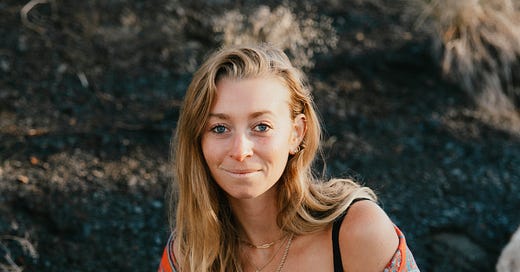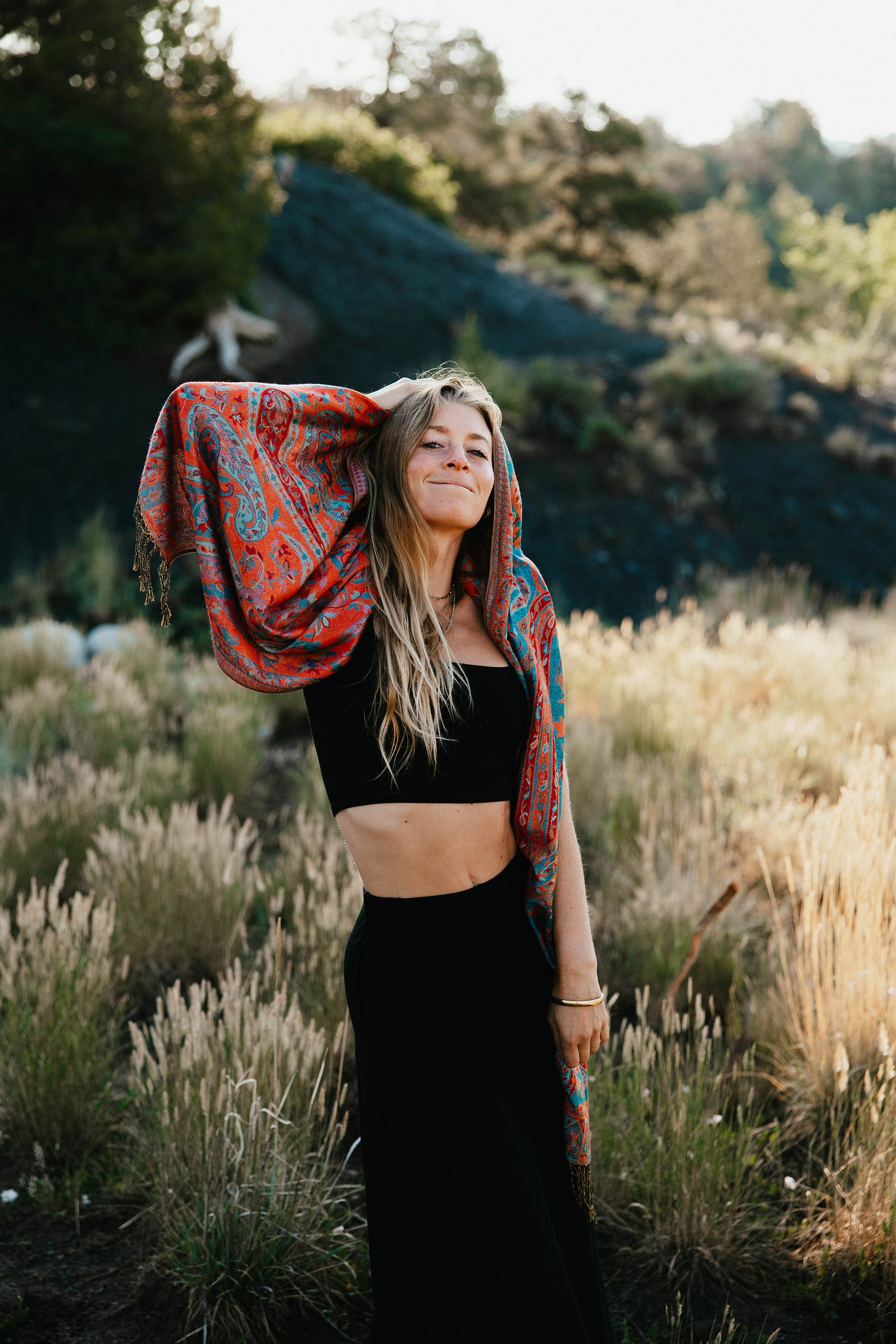Friendly reminder that hitting the little heart ^^ up there is a small gesture that does a lot to help me reach more people ❤️ Thanks!! xo
I grew up asking a lot of questions. I was sometimes too inquisitive for my own good. I would lay awake at night feeling overwhelmed by the mysteries of life and I was afraid of dying by the time I went to kindergarten.
As a gymnast, I hit my breaking point when I started questioning how my brain was somehow telling my body to launch into the air, flip upside down, and land my hands on a 4 inch wide balance beam that’s sitting 4ft off the ground. My mind wouldn’t let my body just do what it had trained for years to do; it couldn’t handle not understanding how it was happening, to the point that I was making it dangerous for myself. (I felt so deeply for Simone Biles when she was struggling with a similar issue at the 2020 Olympics, which she referred to as “the twisties” because when she would attempt a twisting trick her brain would ‘freak out’ and stop her midway through in the air).
When I was in undergrad, I remember a conversation I had with my boyfriend at the time in which I opened up about how dark, depressed, and heavy I would feel if I let my brain inch toward acknowledging the idea of dying someday. I sobbed in his arms admitting that I was so afraid of being gone, and so sad that none of this (life) actually matters, and that I didn’t know what to do about it other than try to avoid it. He suggested that I talk to one of the religious leaders on campus to open up about these fears and feelings and receive some guidance on finding peace.
It made me SO angry that he would even suggest this. In my perspective at the time, trying to seek spiritual solace would mean fooling myself for the sake of perceived safety (AKA lying to myself), which I was unwilling to do.
I grew up in the age of science being valued as the ultimate truth-teller, which is probably the case even more so today. Just say “evidence-based practices” and people automatically respect you more and feel safe and trusting of what you are doing. We love ‘facts’ and feel confident when we can point to data to tell us what is right or true.
For a long time, I fell into this same perspective. I loved learning and wanted to gather all the truth that I could. I got my PhD because I wanted to be able to ask big questions and explore the answers and document the evidence to positively influence the world.
I still love asking big questions and exploring answers… but what I discovered at some point along the way is that that’s what spirituality is too–for me at least.
Spirituality can be defined in a lot of different ways, which is what makes it so confusing. Everyone has different things that they label or categorize as being spiritual, everyone has different ideas that come to mind when they hear the word ‘spiritual,’ and everyone relates differently to those ideas.
For some, ‘spiritual’ has the meaning that is used in the Blue Zones or by researcher Brene Brown, which is to have a sense of belonging to something greater than one’s self. *In the Blue Zones (the areas of the world that have the longest living populations), only 5 of 263 centenarians (people over 100 years old) that were interviewed for the study did not belong to a faith-based community. Every other centenarian said their spirituality was an important part of their life.
For others, ‘spiritual’ is seen as ‘woo woo,’ which has a negative connotation and essentially means they see whatever they are referring to as the exact opposite of being grounded in science.
Yet many things once categorized as spiritual are now gaining scientific backing. The easiest example is meditation. Until very recently, meditation was seen as a spiritual practice reserved for monks, yogis, and spiritual seekers. It wasn’t until the late 2000s that people started studying meditation and finding scientific evidence of the cognitive, emotional, and physical benefits of meditating that it started to be taken seriously. Today, it is widely accepted and is often recommended by healthcare professionals as a practice to improve overall wellness.
The same is true for yoga, acupuncture, microbiome/gut health, visualization, and plenty of other practices. You probably made fun of your hippie aunt who went out into the sunshine every morning when you were a kid and said it was healthy to start the day in alignment with nature’s rhythms, but now Andrew Huberman says we have research to prove it so everyone is going outside to be exposed to sunlight first thing in the morning. I find it all both comical and fascinating. The marketing and storytelling behind anything makes all the difference in selling an idea.
My point is: the difference between what is seen as spiritual and what is seen as scientific might in some cases simply be whether we have studied it (or learned how to study it) and measured the effects.
Furthermore, I feel like science and spirituality, at least in the way that I personally practice them, are much more similar and connected than they are contrasting and separate.
In both cases, the goal is to explore and seek truth and understanding of what is the nature of reality.
In my opinion, the difference is that in science we use systems and methods of testing theories to tell us whether something is true, whereas with spirituality it comes down to our own knowing.
I think both hold value, and neither should be inherently prioritized above the other. Obviously in certain situations one will be more relevant but in general, both are necessary in their own ways.
I would argue that the focus on science has disconnected us from our own intuition and knowing. We have learned to outsource information rather than listening inward to find what feels true to us. The human body and soul have so much wisdom for us, yet we have stopped turning towards ourselves to access it, instead looking to information outside of us and valuing that over our own knowing.
I believe that spirituality and science should be seen as a venn diagram that is much more overlapping than not. (I didn’t bring it into this conversation, but I feel like philosophy is also highly overlapping here!)
Also, in case it isn’t clear: I am not at all anti-science. I love science! I love evidence! I love the process of asking questions and figuring out how to gather answers and then sorting through the findings and drawing theoretical conclusions. It’s fun!! And important! We need to have methods to apply this type of reasoning. I’m so glad I got my PhD and get to do research that contributes more information to topics I care about.
I just think science is overemphasized and overvalued, and that spirituality and subjective reasoning and intuition are underemphasized and undervalued – AND that it’s all way more alike than people realize.
❤️
Do you agree? Disagree? Have your own points you want to add to the conversation? I would love to hear any reflections and responses in the comments below.
Thanks for reading!
Tara
P.S. - Are you in a season of growth right now or ready to step into one? I would love to be your guide and mentor in the process. One of my greatest skills is the ability to see and understand others (oftentimes even better than they can see and understand themselves) and ask the right questions to help you uncover and discover your truth. If this calls to you, you can apply here.
Additionally, if you are interested in healing your relationship with food and body via inner work to address the root cause and learn how to (finally!) live in alignment with your values, my signature Reconnect Academy course is currently being offered at a sale rate. You can also choose to receive weekly coaching with me as you go through the course.
🌸 Big love! I’m rooting for you, always.






I love the way you embrace it all. Life is fluid
You are a divine goddess 🤍🫶